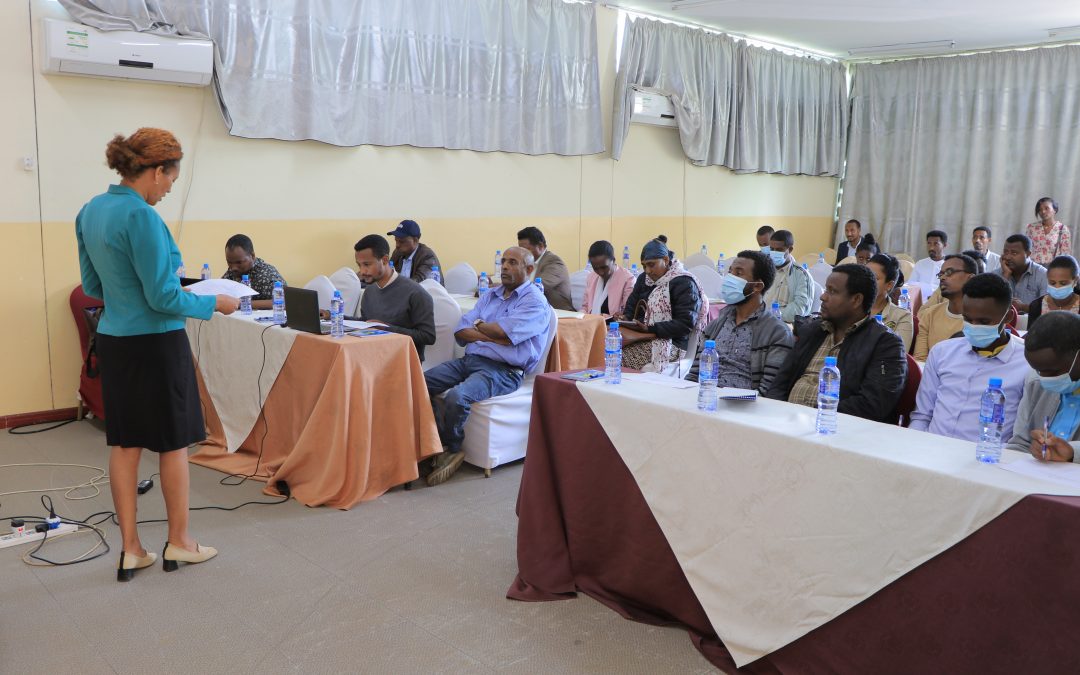Two important policy advocacy workshops were held by DSW Ethiopia in Bahir Dar and Jimma towns recently. The main aim of these advocacy platforms was to sensitize stakeholders on youth sexual and reproductive health and rights (SRHR) and gender policy framework. Now in its second year, the project “Enhancing the SRHR and Livelihood Prospects of Young People” is being financially supported by Stiftungsallianz fϋr Africa gGmbH (SAfA). SAfA is committed to reaching more than 73,000 vulnerable young people in Ethiopia aged between 15 – 29 years.
The first of these two advocacy workshops held on SRHR and Gender Policy Framework took place on 29 August 2022 at the Homeland Hotel in Bahir Dar, in the Amhara region. The second workshop took place on 5 September 2022 in Jimma in the Oromia region. Bahir Dar and Jimma are two of the major towns where targeted communities have been taking part in the project since its inception in May 2021. Regional stakeholders at different levels who are involved in the project took part in the workshops. Officials from the Federal Ministry of Health (FMoH) were represented as keynote speakers presenting the policy frameworks and their legal provision, including the strategies used to implement the SRHR and gender issues in Ethiopia.
With a focus on violence against women in place, the rate of the legal frameworks that promote the enforcement and monitoring over gender equality under the Sustainable Development Goals (SDG) indicator for Ethiopia stood at 41.7 percent (UN Women, 2021). In his opening speech, Mr. Feyera Assefa, Country Director of DSW Ethiopia reminded the stakeholders that “the SRH and gender policy instruments are always assessed by DSW based on the outcomes set in the project’s objectives intent on contributing to the achievements of the third and fifth United Nations (UN) SDGs both in terms of reducing maternal morbidity, mortality, and gender inequality by the year 2030.”

“Since we launched this project in May 2021, we have remained committed to anchoring more and more advocacy workshops such as this, which has been tailored to impact on the enhancement of the SRH and livelihood prospects of young people in our country,” says Feyera as he went on to emphasize the importance of advocating on policy position and framework that address SRHR and gender issues, while at the same time being able to identify their gaps.
“For instance, sexual and gender-based violence (SGBV) which has been triggered over the recent past following the seemingly intractable conflicts in Ethiopia, which still potentially hovered over us have brought about a new challenge. This challenge can be an opportunity for us to start reexamining the gaps hinging upon the existing SRH and gender policy framework. Given this fact, the question would be how we can align the relevant legal provision to our works and address the needs for enhancing the SRHR and the livelihood prospects of youth from gender perspective,” Feyera asks.
Researches affirm that in spite of efforts to undertake numerous development programs and strong policies supported by feasible legal provisions, the degree of disparity in SRH and many other gender-related indicators in Ethiopia remain at stake and significant challenges are still lingering. “Despite the challenges lingering, there are so many opportunities worth exploring in the various national strategic documents, most importantly, the National Adolescent & Youth Sexual & Reproductive Health Strategy. These strategic materials are drawn not only from the youth-friendly policies adopted in Ethiopia but also the fact that the Federal Constitution itself provides explicit legal basis for enhancing the SRHR of young people,” stresses Mr. Abebe Tilaye, Adolescent and Youth Sexual and Reproductive Health Expert with FMoH and who presented his keynotes in Bahir Dar.

Further to this, Tilaye recounts, “our recent data indicates that disparity exists in sexual debuts across rural and urban youth observed at 16 and 18 years of ages in their respective categories. Overall, the unmet need for the family planning information and services remain at 26 percent and this figure obviously correlates to the prevalence of unintended teenage pregnancies. The way forward in meeting the needs of youth SRHR, enhancing their livelihood prospects and addressing the gender-related problems, including the sexual violence is bound to draw synergy and commitments from key development partners. In this case, high stakes rest upon DSW to play a lead role in the efforts to engage in more advocacy activities. By the same token, we will be able to increase the existing relatively low budget allocation or limited resources available for SRH programs in Ethiopia both at national and international sources”.
“When it comes to initiating and seriously undertaking a development intervention focusing on SRHR needs of adolescents and youth, DSW always exhibits consistency and we appreciate its commitments to increase the demand for the uptake of SRHR/family planning services. However, we also observe often the supply side being in shortfalls and hope this too will be addressed as DSW already set foot into conducting service provision,” asserts Dejene Deme, Adolescent and Youth SRH Expert with FMoH, who made a keynote speech at the workshop in Jimma.
The two advocacy workshops’ deliberations have streamlined strong action points, which include the demands created for SRHR services should meet the supplies in need through coordinated efforts. Government stakeholders along with other partners can work in a spirit of shared mission to create a sustainable environment for the supplies of SRHR/FP services. More so, the limitation observed in terms of effective implementation of the SRHR and gender policies at the local government units need to be addressed.

Photographs: private
